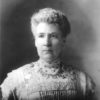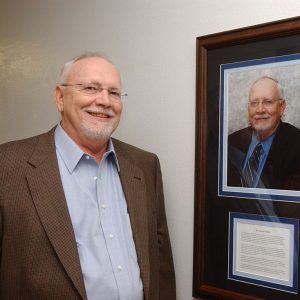calsfoundation@cals.org
Donald Holley (1940–2012)
Donald Holley was a historian, author, and longtime professor at the University of Arkansas at Monticello (UAM). His scholarship generally focused on agricultural history in Arkansas in the twentieth century. He was given a Lifetime Achievement Award by the Arkansas Historical Association in 2007.
James Donald Holley was born on February 24, 1940, in Vernon, Alabama, to the Reverend William Albert Holley and Wilma Harris Holley. His parents were from Alabama, but the family lived in Texas for a time when Holley was young. He eventually moved to Louisiana, where he finished his education. On August 14, 1962, Holley married Bankie Rae Hollis at a Church of Christ in Ruston, Louisiana. The couple had two children together.
Holley received his bachelor’s degree at Louisiana Polytechnic Institute in 1962 and a master’s degree in sociology at Louisiana State University in 1964. He also obtained a master’s in statistics from the University of Texas in Austin. In 1969, he graduated with a doctorate in history from Louisiana State University, Baton Rouge, after completing a dissertation titled, “The New Deal and Farm Tenancy: Rural Settlement in Arkansas, Louisiana, and Mississippi.” He completed his dissertation under the direction of Professor Burl Noggle of the Department of History.
Before he finished his PhD, Holley had moved to Monticello (Drew County), where he took a position teaching in the Social and Behavioral Sciences Department at what was then Arkansas A&M. He taught at the school for forty years and served for a time as department chair. He also edited the Drew County Historical Society Journal for a number of years.
His first book, based on his dissertation, was Uncle Sam’s Farmers: The New Deal Communities in the Lower Mississippi Valley, which won the Agricultural History Society Award in 1975. His second book was The Second Great Emancipation: The Mechanical Cotton Picker, Black Migration, and How They Shaped the Modern South, published in 2000 by University of Arkansas Press. His last book was Celebrating a Century of Opportunity, a volume commissioned by UAM for its centennial anniversary. He retired from teaching in 2007.
Holley was the author of a number of peer-reviewed articles in the Arkansas Historical Quarterly, including “Trouble in Paradise: Dyess Colony and Arkansas Politics” (1973); “Carl E. Bailey, the Merit System, and Arkansas Politics, 1936–1939” (1986); “The Second Great Emancipation: The Rust Cotton Picker and How It Changed Arkansas” (1993); “Leaving the Land of Opportunity: Arkansas and the Great Migration” (2005); and “A Look Behind the Masks: The 1920s Ku Klux Klan in Monticello, Arkansas” (2011). In addition, he contributed essays to the journals Agricultural History and Louisiana History.
Holley’s wife, Bankie Rae Holley, was an accomplished musician and high school band teacher in Monticello. One of her students was Rob Shrock, a pianist and composer who has directed the orchestra at the Academy Awards ceremony. The Bankie Holley Memorial Scholarship, begun in 2015, is named after her.
Holley died on November 19, 2012, in Little Rock (Pulaski County). He is buried in Oakland Cemetery in Monticello. His wife died in 2014 and is buried next to him.
For additional information:
Holley, Donald. Uncle Sam’s Farmers: The New Deal Communities in the Lower Mississippi Valley. Urbana: University of Illinois Press, 1975.
“James Donald Holley.” Stephenson-Dearman Funeral Home. https://www.stephensondearman.com/services.asp?page=odetail&id=686&locid=0 (accessed May 10, 2023).
Colin Edward Woodward
 Divergent Prosperity and the Arc of Reform, 1968–2022
Divergent Prosperity and the Arc of Reform, 1968–2022 Education, Higher
Education, Higher Historic Preservation
Historic Preservation James D. Holley
James D. Holley 



Comments
No comments on this entry yet.